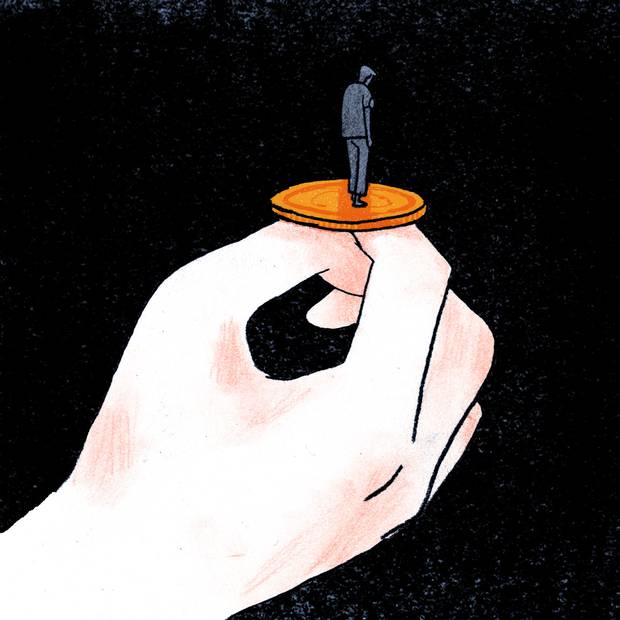Facts & Arguments is a daily personal piece submitted by readers. Have a story to tell? See our guidelines at tgam.ca/essayguide.
On a first date recently, the conversation turned to the topic that takes up much of my "spare" time while completing a masters of architecture at UBC: my brother.
“What does he do?” I’m asked.
Some days I’ll use my go-to line, “He’s still finding himself.” Other days I’ll play it straight, “He’s a drug addict and alcoholic with mental-health issues.”
I always hope my date will just ask me about our truly amazing childhood instead.
We lived in a leafy Vancouver neighbourhood and I grew up proud of my brother. Everyone from the grocery-store manager to the homeless man outside of Safeway knew my brother by his charismatic charm. I was his shy little sister.
Our parents always put us first, and still do. My brother was in enriched classes and has an IQ in the 95th percentile. We had tutors for anything we showed an inkling of struggle with, we went on annual vacations, went out for dinner often and had a waterfront cabin on the coast. We grew up with all the love we could dream of, never wanting for anything.
My brother does not look like a drug addict. He's stylish, personable and smiles with the kindest dimples. He can relate to anyone on the planet with unexplainable empathy. It was always clear that my brother liked to have fun; once, friends of his told me "although we like to party, your brother is another animal." And when he moved back to Vancouver about five years ago, we began to realize that his life had spiralled out of control.
Recently, I helped my dad collect receipts for my brother's various expenses: rehab, prescriptions, ambulances and so on. It reminded me, once again, about the effort and the money that goes into keeping him alive.
Not that this should be about money, but it seems to be what makes people listen. In the past four years, my parents have spent at least $250,000 on my brother's plight. Plus the expenses this in turn costs them for missing work, cancelling trips and stress-related health problems. My parents are emotionally exhausted, but they refuse to give up.
On that awkward first-date conversation, it usually goes something like this:
"First, he should detox." He has tried detox centres multiple times. However, there are rarely beds available. Imagine convincing an addict to go to detox, then telling them to wait? When he does finally get admitted, he can leave at any time at his own free will.
"Has he been to rehab?" We have tried rehab, both public and private. Public has a long waitlist and it lacks resources in terms of staff and services. Private rehabs cost around $20,000 to $30,000 for 21 days of treatment. He has done this five times (at least) at three different facilities.
"Have you tried a recovery house?" Yep. This seemed promising at first. It cost $7,000 a month. That stint lasted seven months. My parents then hired someone to live with him, but the only person willing to do this, who my brother can also tolerate and who understands addiction, is a recovering addict.
The four months they lived together (which cost $5,000 a month – what a savings compared with the recovery house!) were probably my parent's most peaceful. But my brother's reckless behaviour caused this individual to quit fearing it was compromising his own recovery. I get that.
"Do you ever see him?" My parents and I talk to my brother daily and see him several times a week. Our conversations can be enjoyable. But we have seen him overdose so many times that we are heartbreakingly jaded by the experience. The last meal I had alone with my brother ended with me calling an ambulance as he returned from the bathroom clearly inebriated, incoherent, then fully convulsing. We pray they admit him so we know exactly where he is. This rarely happens.
Each ride in an ambulance is about $100, let alone the additional expense to our health system. The emergency-room staff know him by name. In 2015 alone, he was in the ER more than 20 times; even three times in one day, but who's counting?
"Just get him a psychiatrist." My parents have called many psychiatrists, psychologists and addiction specialists that are too busy to see him. The few psychiatrists he did see just prescribed him medication with little or no follow-up. Psychologists and psychiatrists charge on average $180 an hour, plus the cost of prescriptions, which aren't covered by our universal health coverage.
"Cut him off." Oh, we've tried that. He would call my parents every day. It ended with him breaking into each of my parent's houses multiple times, damaging their property (and their hearts). Alternatively, he hangs out at my father's busy office wanting "just $5" – causing much concern to my dad, curiosity from his clients and stress for his staff.
Conversations about my brother also include tips such as, "Just let him be homeless," "Stop enabling him," "Let him rack up a bill with a drug dealer and get beaten up – that will teach him," or "You have tried everything. Give up." But the crowd favourite, which is always said in a hopeful, encouraging tone and with such conviction, is: "Just let him hit rock bottom."
He will not hit rock bottom and have the miraculous epiphany that you expect. My brother's rock bottom will be six feet under. This is our reality.
No one chooses this life. What are we supposed to do? We will clearly try anything.
The Globe has granted the writer anonymity.
